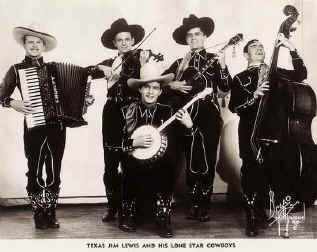
Horace Leon Chappelear (born August 1, 1909 in Gilmer (Texas) , † October 22, 1962 in Gladewater ) was an American country musician ( voice and guitar ) and songwriter , who was one of the pioneers of Western Swing .
Chappelear founded the Lone Star Cowboys in 1929 with the brothers Joe and Bob Shelton. After beginning with the radio station KGKB in Tyler , the three musicians moved to Shreveport , where they came under contract with the radio station KWKH. As a soloist Chappelear played his first record for Gennett ; a Jimmie Rodgers- inspired number called Trifling Mama Blues . In 1932, he recorded for Champion the record Little Joe The Wrangler (with the B side I'd Like to Be in Texas for Roundup in Spring ) on. After the reunion with the Sheltons worked in mid-1933 as a companion of the singer Jimmie Davis at a recording session for Bluebird . Davis gave the Lone Star Cowboys a record deal with RCA Victor ( Deep Elm Blues / Just Because) . After musical differences Chappelear separated from the Sheltons and founded
the band Leon's Lone Star Cowboys , with which he musically approached more to jazz . With the band he recorded in the mid-1930s, a series of records like New Do Right Daddy for Decca until a serious traffic accident interrupted his career, from which he never recovered properly. After the dissolution of the Leon's Lone Star Cowboys
Chappelear retired temporarily from the music scene, then worked for a while as a police officer until he lost the job because of corruption , finally as pipelayer.
In the late 1940s, Chappelear began performing again as a musician; He shortened his surname to Chappel and played with a honky-tonk band called Lone Star Ramblers. Then he got the opportunity to play in the backing band of Jimmie Davis, the Sunshine Boys. After gaining a record deal with Capitol , in 1951 he recorded a number of songs for the label, including blues-influenced Slow Down Sweet Mama followed by I'm a Do-Right Daddy and Do not Dog Me 'Round (1953) ). One last single was Booger Blues / You're a Lovin 'Woman . After Capitol had not renewed his contract, he returned to Shreveport and acted as head of the local dog kennel. Health problems resulting from his previous accident led to a condition of depression , leading to suicide in 1962 following a visit to his sister in Gladewater, Texas.
Born November 12 1899 in Santa Anna, Texas and died February 23, 1981 in Dallas, Texas. Nothing is known now of Newman’s childhood or of his teenage years but he grew up to become one of the pioneers of western swing music. By his mid-twenties, he played piano, piano accordion and guitar and worked as a staff musician at WRR Dallas. In 1926, apart from his studio duties, he began to play piano as one half of the Mystery Duo, with John Thorvald (guitar). In 1931, he played guitar as part of a quartet known as the Wanderers, where he became associated with guitarist Jim Boyd. The group moved to WFAA in 1932, but Newman and Boyd with different musicians returned to WRR, as Roy Newman And His Boys, the following year. Also at WRR at that time was Bill Boyd, who played and recorded with musicians known as the Cowboy Ramblers. In reality, some of the musicians who played and recorded with Newman also played on Boyd’s recordings, but each band managed an individual sound and both played on WRR’s popularNoon Hour Varieties. Newman And His Boys (who sometimes numbered 10 musicians) recorded 72 sides between 1934 and 1939, and established a considerable reputation through their broadcasts and appearances in the Dallas and Fort Worth areas. Although never afforded the publicity gained by Bob Wills or Milton Brown, Newman, who probably played more jazz than his contemporaries, played his part in popularizing western swing music, before he disbanded in 1940. Important group members over the years were fiddlers Art Davis and Thurman Neal and Holly Horton (clarinet). Newman continued to work as a staff musician at WRR and/or WFAA until his retirement. He died at his home in 1981, the same year that an album of his early work was released. Recordings have also appeared on